Notable alumni
- Sam Watkins, American writer and humorist
Jackson College was a college affiliated with the Presbyterian Church, located in Columbia, Tennessee. [1] [2] [3] [4]
Jackson College was founded as the Manual Labor Academy at Spring Hill, Tennessee, in 1830. [1] [4] Its original enrollment was seven students. [4] As part of the curriculum each student was required to work two hours per day at a manual task. It was thought that this manual labor was beneficial to the student. While at some schools students engaged in mechanical tasks, the Academy was not able to build shops or buy the tools necessary. The students, therefore, engaged in farming. [1]
Some time around 1832, through an act of the legislature, the academy became Jackson College. During this time, the manual labor aspect of the academy was maintained. [1] [4] In 1837 the College moved to Columbia. At this point, the manual labor aspect of the curriculum that began with the original academy was abolished. [1] During the American Civil War the college was burned, along with much of Columbia, by the Union Army. [1] It is likely that it was at this time that the college ceased to exist, but the references available are not clear.
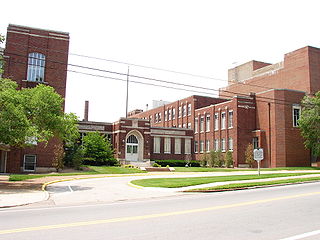
Meharry Medical College is a private historically black medical school affiliated with the United Methodist Church and located in Nashville, Tennessee. Founded in 1876 as the Medical Department of Central Tennessee College, it was the first medical school for African Americans in the South. While the majority of African Americans lived in the South, they were excluded from many public and private racially segregated institutions of higher education, particularly after the end of Reconstruction.

Deep Springs College is a private junior college in Deep Springs, California. With the number of undergraduates restricted to 26, the college is one of the smallest institutions of higher education in the United States. Though it offers an associate degree, most students transfer into a four-year college after completing their studies. Those enrolled pay no tuition and are given room and board.

Theodore Dwight Weld was one of the architects of the American abolitionist movement during its formative years from 1830 to 1844, playing a role as writer, editor, speaker, and organizer. He is best known for his co-authorship of the authoritative compendium American Slavery as It Is: Testimony of a Thousand Witnesses, published in 1839. Harriet Beecher Stowe partly based Uncle Tom’s Cabin on Weld's text; the latter is regarded as second only to the former in its influence on the antislavery movement. Weld remained dedicated to the abolitionist movement until slavery was ended by the Thirteenth Amendment to the United States Constitution in 1865.
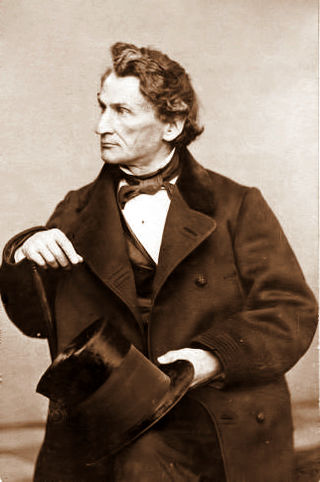
James Dwight DanaFRS FRSE was an American geologist, mineralogist, volcanologist, and zoologist. He made pioneering studies of mountain-building, volcanic activity, and the origin and structure of continents and oceans around the world.
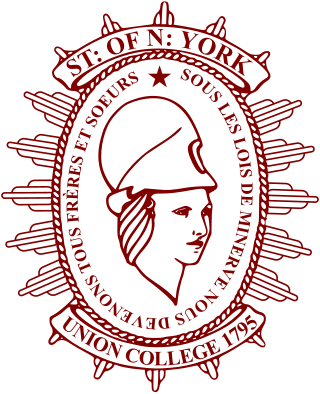
Union College is a private liberal arts college in Schenectady, New York, United States. Founded in 1795, it was the first institution of higher learning chartered by the New York State Board of Regents, and second in the state of New York, after Columbia College. In the 19th century, it became known as the "Mother of Fraternities", as three of the earliest Greek letter societies were established there. Union began enrolling women in 1970, after 175 years as an all-male institution. The college offers a liberal arts curriculum across 21 academic departments, as well as opportunities for interdepartmental majors and self-designed organizing theme majors. The school offers ABET-accredited undergraduate degrees in computer engineering, bioengineering, electrical engineering, and mechanical engineering. About 60% of Union students engage in some form of international study or study abroad.
Refusal of work is behavior in which a person refuses regular employment.
Knox College is a private liberal arts college in Galesburg, Illinois. It was founded in 1837 and offers more than 60 courses of study.

Robert Looney Caruthers was an American judge, politician, and professor. He helped establish Cumberland University in 1842, serving as the first president of its board of trustees, and was a cofounder of the Cumberland School of Law, one of the oldest law schools in the South. He served as a Tennessee state attorney general in the late 1820s and early 1830s, and was a justice of the Tennessee Supreme Court in the 1850s and early 1860s. He also served one term in the United States House of Representatives (1841–1843). In 1863, he was elected Governor of Tennessee by the state's Confederates, but never took office.

John William Burgess was an American political scientist. He spent most of his career at Columbia University where he in 1880 created the first graduate school in Political Science. He has been described as "the most influential political scientist of the period" and "the father of American political science."
Events from the year 1834 in the United States.

Landon Cabell Garland (1810–1895), an American, was professor of physics and history and university president three times at different Southern Universities while living in the Southern United States for his entire life. He served as the second president of Randolph–Macon College in Ashland, Virginia, from 1836 to 1846; then professor from 1847 to 1855, and then third president of the University of Alabama in Tuscaloosa, Alabama, from 1855 to 1867; and first chancellor of Vanderbilt University in Nashville, Tennessee, from 1875 to 1893. He was an apologist for slavery in the United States before the Civil War, but afterward became a vociferous spokesperson against slavery.

Beriah Green Jr. was an American reformer, abolitionist, temperance advocate, college professor, minister, and head of the Oneida Institute. He was "consumed totally by his abolitionist views". Former student Alexander Crummell described him as a "bluff, kind-hearted man," a "master-thinker". Modern scholars have described him as "cantankerous", "obdurate," "caustic, belligerent, [and] suspicious". "He was so firmly convinced of his opinions and so uncompromising that he aroused hostility all about him."

William Heard Kilpatrick was an American pedagogue and a pupil, a colleague and a successor of John Dewey. Kilpatrick was a major figure in the progressive education movement of the early 20th century.
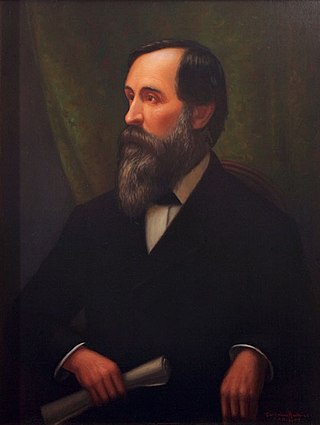
John Berrien Lindsley (1822–1897) was an American Presbyterian minister and educator in Nashville, Tennessee.
Poindexter Dunn was a Confederate Army veteran and American politician who served five terms as a U.S. Representative from Arkansas from 1879 to 1889.

The East Tennessee Female Institute was an all-female institution of higher learning that operated in Knoxville, Tennessee, United States, from 1827 until 1911. Originally chartered as the Knoxville Female Academy, the school offered high school and college-level courses to the women of Knoxville and surrounding counties in the years before the University of Tennessee became coeducational. With the rise of free public education in Knoxville in the early 1900s, enrollment at the institute, which was tuition-based, gradually declined.

The Oneida Institute was a short-lived (1827–1843) but highly influential school that was a national leader in the emerging abolitionist movement. It was the most radical school in the country, the first at which black men were just as welcome as whites. "Oneida was the seed of Lane Seminary, Western Reserve College, Oberlin and Knox colleges."

Wilkins F. Tannehill (1787–1858) was an American Whig politician and author. He served as the Mayor of Nashville, Tennessee from 1825 to 1827.
A manual labor college was a type of school in the United States, primarily between 1825 and 1860, in which work, usually agricultural or mechanical, supplemented academic activity.
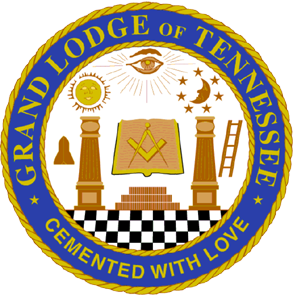
The Grand Lodge of Tennessee, officially the Grand Lodge of the Ancient and Honorable Fraternity of Free and Accepted Masons of the State of Tennessee, is the main governing body of Freemasonry within Tennessee. This Grand Lodge was established in Knoxville, Tennessee, on December 27, 1813, by nine Masonic lodges operating within the state. In 2017, the Grand Lodge of Tennessee had a reported membership of 34,858 Master Masons, and by 2020 the membership had fallen only slightly to 33,200.